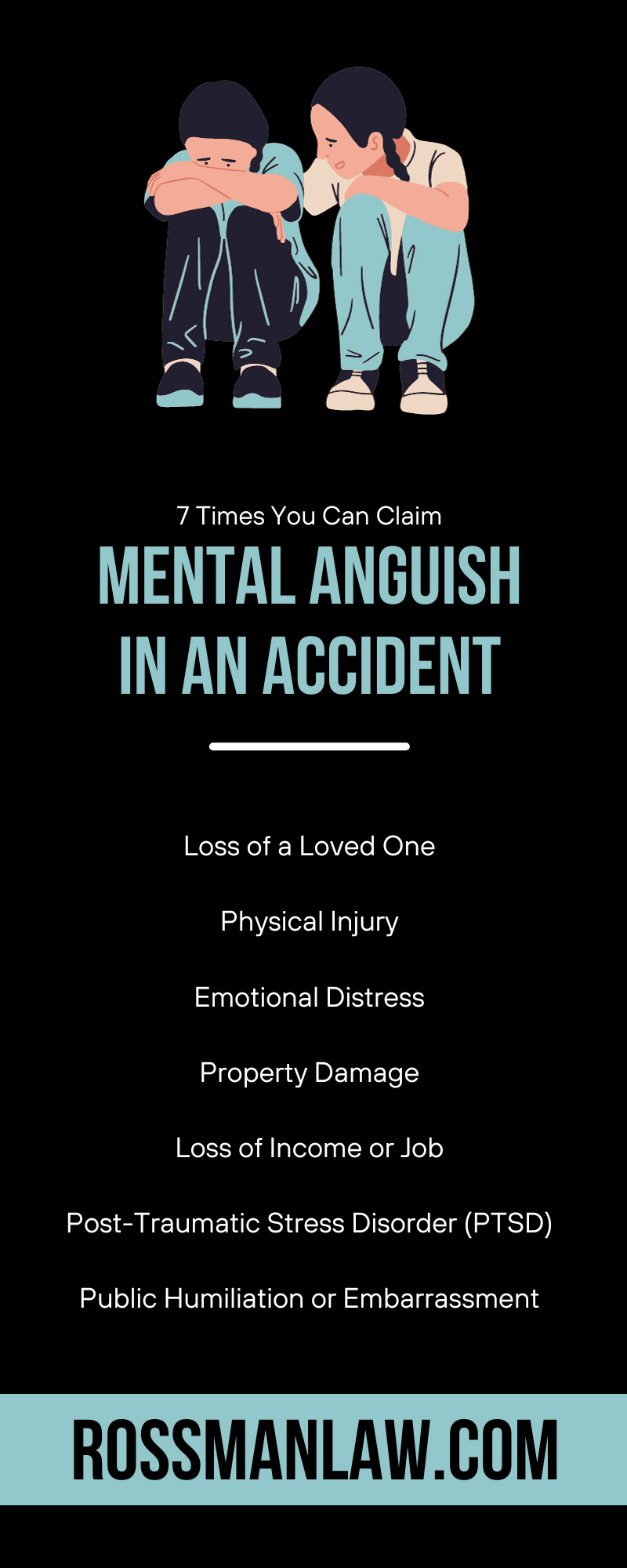
5 Common Birth Injuries Pregnant Mothers Should Know
January 4, 2024
Is it Possible To Sue an Employer if You Quit?
January 17, 2024Imagine going for a casual drive with the windows down, enjoying the cool breeze and warm sunlight, when suddenly, you find yourself in the middle of a car accident caused by a negligent driver. While you’re likely familiar with the physical injuries that can result from a collision, the emotional turmoil you may face is just as important. Can you claim compensation for mental anguish in such a situation? The answer is yes—there are certain times you can claim mental anguish in an accident and gain compensation.
The Legal Definition of Mental Anguish
Many people might think of mental anguish as an umbrella term for emotional pain, distress, or trauma brought on by an accident. However, in legal terms, mental anguish has a more specific definition. It refers to a particular range of emotions experienced by an accident victim, such as depression, anxiety, guilt, fear, and shock. It’s essential to keep in mind that these emotions must result from the accident itself and the pain or distress arising from the physical injuries sustained during the event. In other words, the emotional distress must stem from the negligent actions of another party that caused the accident.
The Relationship Between Accidents and Mental Anguish
In certain instances, accidents can lead to mental anguish, especially when the accident is severe or leaves long-lasting consequences. For example, if you’re involved in a car collision that results in permanent disfigurement or the loss of a loved one, the emotional toll this can take on you can be overwhelming. When determining whether to consider mental anguish as a component of your claim, courts will look at factors such as the severity of the accident, the impact on your daily life, and how the accident has affected your relationships.
Instances Where You Can Claim Mental Anguish
Not all accidents warrant a claim for mental anguish; in most cases, an accident must be severe enough to meet the legal definition and have a significant impact on your life. Some common times you can claim mental anguish in an accident include:
Loss of a Loved One
It’s not uncommon for someone to experience intense grief and emotional trauma after losing a loved one in an accident. If it can be proven that the death was caused by negligence, you may be able to claim mental anguish as part of your wrongful death lawsuit.
Physical Injury
Mental anguish often stems from physical injuries sustained during an accident. If you experience chronic pain, permanent disfigurement, or other long-term consequences due to the accident, you may be able to claim compensation for the mental distress these physical injuries have caused.
Emotional Distress
In certain cases, accidents can cause emotional distress, even without any physical injuries. For example, if you witnessed a traumatic event or were in danger of harm during the accident but were not physically injured, you may still be able to claim mental anguish as part of your compensation.
Property Damage
Although not as common as physical injuries or emotional trauma, property damage can also lead to mental distress. For example, if an accident results in damage to your vehicle, home, or other personal property, the stress and anxiety of dealing with repairs and financial losses may qualify you for compensation for mental anguish.
Loss of Income or Job
If an accident causes a severe injury that prevents you from working or leads to job loss, the resulting financial strain and emotional distress may earn you compensation for mental anguish.
Post-Traumatic Stress Disorder (PTSD)
After experiencing a traumatic event, it is possible for individuals to develop PTSD, which can include symptoms such as flashbacks, anxiety, and depression. If an accident caused by negligence leads to the development of PTSD, you may be able to claim compensation for mental anguish.
Public Humiliation or Embarrassment
In some cases, an accident can result in public humiliation or embarrassment, particularly if someone captures it on camera or a large number of people witness it. If this causes significant emotional distress and affects your daily life, you may be able to claim compensation for mental anguish as part of your overall lawsuit.
While these are some common situations where you can claim mental anguish, it’s essential to consult an experienced personal injury lawyer to determine the specifics of your case and whether you may be eligible for compensation.
How To Prove Mental Anguish in a Court of Law
To successfully claim mental anguish, you must provide evidence that the accident caused your emotional distress. This can include medical records, therapy or counseling notes, and testimony from friends and family.
In addition to this evidence, it’s also crucial to document any changes in your behavior or daily life since the accident. This can include difficulty sleeping, avoiding certain activities or places, and increased anxiety or depression.
By providing tangible evidence of the impact the accident has had on your life, you can strengthen your case for claiming mental anguish.
Potential Challenges in Making a Mental Anguish Claim
Although mental anguish can be a valid component of an accident compensation claim, it’s not always easy to prove and you may face some challenges. One common challenge is facing skepticism or pushback from insurance companies who try to downplay the emotional impact of the accident. In addition, there may also be a stigma surrounding mental health, making it more difficult for some individuals to speak openly about their emotional distress.
It’s essential to work with a knowledgeable and experienced personal injury lawyer who can help you navigate these challenges and advocate for your right to compensation for mental anguish. They can also provide valuable assistance in gathering evidence and building a strong case on your behalf.
Rossman Law Group’s personal injury lawyers in Boise, Idaho, are ready to be your advocates in your personal injury case. If you find yourself in one of the many instances where you can claim mental anguish in an accident, reach out to the experts for support. Remember, you have the right to seek compensation for all forms of suffering caused by someone else’s negligence. Don’t let mental anguish go unrecognized in your accident claim.






